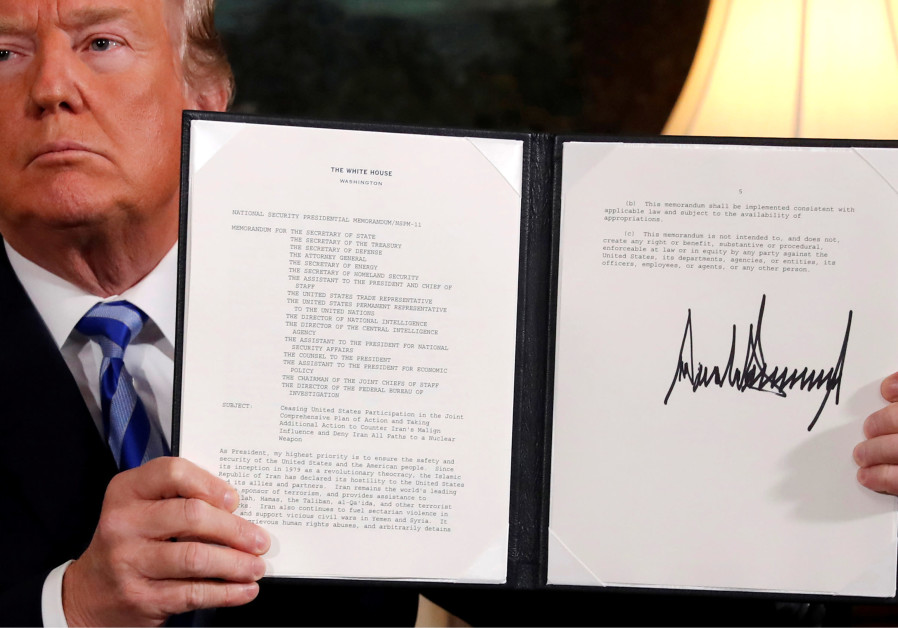Is the Iran nuclear deal dead, or only wounded?

US President Donald Trump holds up a proclamation declaring his intention to withdraw from the JCPOA Iran nuclear agreement after signing it in the Diplomatic Room at the White House in Washington, May 8, 2018. (photo credit: JONATHAN ERNST / REUTERS)
Is the Iranian nuclear deal alive, wounded or dead?
As with many actions by President Donald Trump, the full answer will not be clear until some time passes. But overall the deal is a lot closer to being dead than either alive or wounded.
What about Trump’s speech puts the deal on its deathbed, what leaves an opening for it to survive, and how did we get here?
The narrative kept shifting recently.
Weeks before Donald Trump’s Iran nuclear deal “fix it or nix it” deadline, observers started to predict that he would force the Europeans into negotiating a side agreement that fixed the deal’s holes other than the “sunset clauses.”
The sunset clause issue was the concern that Iran’s nuclear program would have no limits once the deal expired.
If a separate agreement could be signed to address Iran’s ballistic missile program, its terrorism in the Middle East and the limits on IAEA inspectors’ ability to inspect military sites for traces of nuclear weapons, then maybe the sunset issue could be worked out later.
Days before Trump’s speech the narrative had shifted to that he would formally withdraw from the deal, but quietly look the other way on enforcing sanctions.
This was and is the heart of his speech.
All of the innuendo about being “in” or “out” of the deal matters, but the real question always was whether the US would enforce secondary sanctions against its EU allies and other countries if they do business with Iran.
Had Trump announced the US was exiting the deal, but left the sanctions issue vague and looked the other way while the EU and others did business with Iran, the deal could have been declared wounded, but not dead.
But that was not enough for the US president.
His strategy is clearly not to put band-aids on the deal’s holes and ask Iran nicely through the EU to agree to some fixes.
And observers who say that he was only interested in keeping a domestic campaign promise missed some of the spirit of his speech and whom Trump has hired recently onto his national security team.
The Jerusalem Post has interviewed Trump’s new National Security Adviser John Bolton multiple times.
Bolton is pro Iran-regime change and pro using brute military-diplomatic threats and brinkmanship to achieve desired policy goals.
Trump and Bolton want to stand over Iran threateningly and demand it agree to a new deal with all of the changes they want.
Why then should the deal be described as on its deathbed, but not totally dead?
The 90 days.
Trump did not mention the 90 days, but the way the sanctions work and as leaked right before his speech, the US nuclear sanctions as currently structured do not kick in for 90 days.
His mention of still wanting to cut a deal with North Korea also was a sign that he is willing to cut deals with a regime he has threatened, even if only on his terms.
That gives time to negotiate and salvage the situation.
At this point, whether that something is called a modified old deal or a new deal is less important than whether the US and Iran are on course toward some kind of détente or whether they are on course toward a conflict.
Critics of Trump have said that his leaving the deal will inevitably lead to war.
That is not true. Ninety days have to pass, Iran has to feel the heat enough to withdraw from the 2015 agreement, and it has to decide to dare the US by restarting to highly enrich uranium (as opposed to for example just start failing to cooperate on some smaller issue) before war is really in the air.
But by formally exiting the deal and signing sanctions to kick in in 90 days (another option was 180 days), Trump is signaling he is more comfortable with that living-on-the-edge scenario achieving his goals of Iran ending its pursuit of nuclear weapons and restraining its support for terrorism, than he is with another half-year of negotiations to only achieve some of his aims.
Whether the deal, or a new version, makes a late comeback or dies on the deathbed, is now mostly up to Iran and the EU.
Both Iran and the EU talked tough until recent weeks. The EU threatened to counter-sanction and sue the US in international forums. Iran threatened to pull out if the US committed even a minor violation of the 2015 agreement.
But in the last couple of days, both Tehran and Brussels have said they will keep the deal even if the US pulls out. That suggests Trump may have read their positions correctly and that they might respond to pressure. Still, Iran has never wavered from saying it will not amend the deal.
Within 90 days, we will likely know whether Trump’s gamble is starting to pay off or whether the deal will have been killed with no plan B to block Iran from rushing to a bomb, other than a military strike.





Comments are closed.